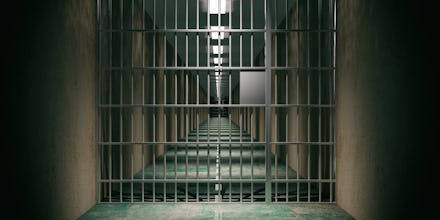Coronavirus deaths in prisons have skyrocketed 73% in a month

The total number of coronavirus deaths in the United States has exceeded 115,000, but not everyone is impacted the same. Early in the pandemic, many warned that mass incarceration — including jails, prisons, and immigration detention facilities — posed a uniquely American risk during the pandemic, with people packed in close quarters without reliable access to hygiene products. Recently, The New York Times reported that prison deaths due to the coronavirus have skyrocketed in a month.
Throughout the United States, 2.3 million people are incarcerated in jails and prisons alone. As public health experts stressed the need for social distancing and urged people to wash their hands, sanitize their clothing, and get tested, advocates pointed out that incarcerated people would be unable to follow those guidelines. After all, how can you properly wash your hands without soap or clean water? How can you know if you have coronavirus when by mid-April, New Jersey had tested less than 1% of its incarcerated population?
The carceral system's inability — or more insidiously, lack of motivation — to care for incarcerated people is rather clear. The New York Times reported that the number of incarcerated people known to have coronavirus has doubled in the past month to over 68,000. If that's not bad enough, prison deaths due to the coronavirus have surged 73% since mid-May — barely a month ago.
"Here is one more reason why we need to end mass incarceration," Sen. Bernie Sanders tweeted in response to reports of coronavirus spreading throughout carceral systems. "In American jails and prisons at least 64,000 people have been infected with COVID-19 and 589 inmates and workers have died. Today we're looking at an unprecedented level of capital punishment."
This news comes after the Trump administration tried fighting an order from U.S. District Judge James Gwin for prison officials to move those who were at heightened risk out of an Ohio prison facing a coronavirus outbreak. Last month, the Supreme Court denied the White House's request.
Earlier this month, Los Angeles County jails — one of the largest county jail systems in the country — said it would test all incarcerated people for coronavirus. At least 60% of people were found to be infected. But the county's plan only came after activists and organizers demanded such widespread testing for months. And given that mass incarceration is a racialized issue, advocates are curious if coronavirus is hitting Black incarcerated people the hardest, but prison officials appear unable — or unwilling — to share the relevant data.
Officials further argue that there's no obvious strategy to handling the pandemic. Dr. Owen Murray, a University of Texas Medical Branch physician who oversees correctional health care at dozens of Texas prisons, told the Times, “If there was clearly a right strategy, we all would have done it. There is no clear-cut right strategy here. There are a lot of different choices that one could make that are going to be in-the-moment decisions.”
However, community organizations have long pointed out a solution. Following the first death due to coronavirus in prison, Believers Bail Out, a community-led effort to bail Muslims from pretrial and immigration incarceration, tweeted, "The U.S. carceral system is not equipped to handle this virus. Incarcerated folk are high-risk and do not have access to the resources/medical care to combat this. We must act now!" The organization followed that message with a call to "Free them all!"
"Releasing people from jail, prison, and immigration detention to their chosen homes and communities and preventing more people from being incarcerated is the best possible protection against the deadly spread of COVID-19, not only among incarcerated people, but among their communities and families as well," Free Them All 4 Public Health said in a press release. "The only acceptable response to COVID-19 is complete decarceration."